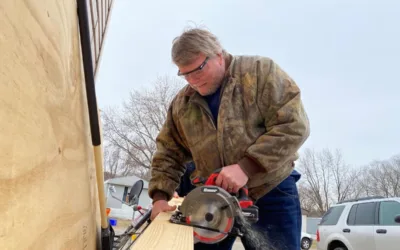
#image_title
Long-term collaborations are keeping shelters open and safe as winter sets in.
COVID-19 has devastated marginalized communities across the state, particularly the homeless. And as another Wisconsin winter with deadly temperatures sets it, the virus has forced some shelters to close and others to severely limit the number of residents they can take in. One state official told Wisconsin Public Media he feared people were going to die in the cold this winter as a result.
But it didn’t have to be that way, as evidenced by what’s happening in the Fox Valley.
Homeless shelters in the Green Bay area, through their long-term partnerships with N.E.W. Community Clinic’s Healthcare for the Homeless program, are keeping their doors open and, so far, their residents and staff safe.
N.E.W. Community Clinic opened in 1970 to provide health care to communities that lacked access. In the 1990’s, the organization started specifically working with Green Bay’s homeless population, which formally became the Healthcare for the Homeless program when it received funding in the 2000s. For over two decades, the organization has worked with area shelters, which chief operating officer Kim Franzen said was key for addressing the pandemic.
“COVID for us has enhanced our collaboration and our trust between N.E.W. Community Clinic and our shelters,” Franzen said. “I think the value of our partnership has increased.”
Kay Hartman, a registered nurse with N.E.W. Community Clinic, serves as the clinic’s part-time COVID-19 coordinator. She works with the shelters to assess their needs and answer any questions they may have.
“Our COVID-19 situation has evolved and continues to change on a day-by-day standpoint,” Hartman said.
One day, a shelter told her they needed hand sanitizer for the residents to carry with them as they go to work or are out and about in the community. Hartman accessed grant funds and purchased hand sanitizer in bulk and distributed it to multiple shelters.
“It seems like a little thing but they said it makes a big difference,” she said.
She did the same with personal protective equipment, accessing facemasks and cleaning equipment that shelters distributed to residents and staff. More recently, she connected the shelters with rapid antigen testing so they can quickly screen new residents or someone who may have been exposed to the virus.
If someone at the shelter becomes ill, the shelter can call on the clinic to bring a team of health professionals to test everyone who may have come into contact with that individual. And if the shelter was unable to isolate that person, Hartman could connect them with a free hotel room through the county. That’s how they’ve been able to avoid any major outbreaks during this pandemic.
“[Healthcare for the Homeless] established those relationships and they make the community clinic a very safe environment and really something that’s comfortable and can be supportive in a very positive way,” Hartment said. “Having those practices in place prior to this pandemic has helped us.”
In addition to helping shelters access resources, Freedom House President Jessica Diederich said Hartman has provided invaluable information on best practices to keep everyone safe.
“One of the biggest things they’ve been is a sounding board. As policies changed, as the CDC changed its recommendations or made any kind of adjustments, we would reach out to [Hartman] and the team at the N.E.W. Community Clinic,” Diederich said. “Having somebody like that at our disposal 24/7 is why we’ve stayed as safe as we have and kept our families safe throughout this pandemic.”
Freedom House has had to make adjustments, such as confining families to their pods, a living space with a bathroom. Whenever they are outside their pods, they are required to wear a mask. Last summer, they opened up the dining room in shifts so residents could sit down at a table and eat. Now, they pick up their food and bring it to their rooms.
“We are still able to provide all the services, it just looks different,” Diederich said.
Office Manager Courtney Mabie with St. John’s Homeless Shelter said the help they’ve received from Healthcare for the Homeless was how they were able to not only keep their current shelter open as a women’s shelter but also open a second, larger space that will be able to house 200 to 250 men this winter.
“We quickly realized that in order to follow CDC guidelines for shelters and congregate living facilities, we would need to cut the capacity of St. John’s Shelter so significantly that 61% of our homeless brothers and sisters would be without a place to be,” the organization wrote in its blog. “This was not an option.”
Franzen said the strengthened relationship between N.E.W. Community Clinic and area shelters will also make vaccination easier to facilitate as well as any other future initiatives.
“Moving forward, I think this really helps us to reach the next stage for the collaboration and realize how we really need each other,” Franzen said.

America’s hottest housing market? A Wisconsin city of 66,000!
Turns out there’s much more to Oshkosh than its annual summer air show... Wisconsin's 9th-biggest city was just named America’s #1 real estate...

Rent increases would be limited to 5% per year under new Biden-Harris plan
The plan calls on Congress to pass a law that would withdraw tax credits from landlords who raise rent by more than 5% annually. If passed, the plan...

The best months to buy (& sell) a Wisconsin house in 2024
Wisconsin has been a seller’s market for more than two years. Since March 2022, average home prices have increased by roughly 7%, while statewide...

Homelessness is becoming an increasingly rural problem in Wisconsin: What’s the fix?
Taylor County, a rural area west of Wausau with a population of around 20,000, had zero homeless shelters until last year—but one is proving to be...




